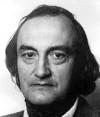Poet
Hugues C. Pernath

Hugues C. Pernath
(Belgium, 1931 - 1975)
© AMVC Letterenhuis
Biography
Hugues C. Pernath is the attractive literary pseudonym of Hugo Wouters, who was born in the suburbs of Antwerp. At the age of sixteen he volunteered for the Belgian army in order to escape the friction between his parents, who were in the process of divorcing. At the beginning of the 1950s his first poems were published in the avant-garde magazine Het Cahier. From 1955 on, with Paul Snoek and Gust Gils, he became the driving force behind the magazine gard-sivik and a pivotal figure in the second experimental generation in Flanders.
1963 saw the appearance of Pernath’s collection Instrumentarium voor een winter (Tool Kit for a Winter), in which through idiosyncratic selection, combination and elimination of words he adapts the syntax of Dutch to his unbridled need to explain his own existence. This he experiences as torn apart and he assembles the irreconcilable oppositions in a poetry that reflects this state of mind.
In his second collection, Mijn gegeven woord (My Given Word, 1966), Pernath gives a poetic and pessimistic report on his loves and friendships, disappointments and antagonisms, hope and despair. Feelings of fear and inferiority alternate with guilt and irritation at the loss of a lover and the disloyalty of friends.
In the early 1960s, Pernath also began making translations and adaptations of dramatic texts (Tartuffe, King Lear, The Hostage, etc.) in collaboration with directors. In 1967 he went on a three-month directing course at the Film and Theatre School in Łodz in Poland, where met such directors as Wajda and Skolimowski. At the end of that year he appeared stark naked in Masscheroen by his friend Hugo Claus, which resulted in the latter’s conviction on a charge of indecency.
Between 1966 and 1970 Pernath wrote Vijftig index-gedichten (Fifty Index Poems), many of which were protests designed to be read at poetry events in Amsterdam, Brussels and Antwerp. These occasional poems show the poet’s intense involvement in social developments.
In 1970 Pernath married Myra, from an Australian Jewish background. He dedicated his Exodus cycle to her: in it memories of his visit to Auschwitz merge with painful childhood memories, a tormenting sense of loneliness, and a heightened sense of mortality. The cycles De acht hoofdzonden (The Eight Cardinal Sins) and De tien gedichten van de eenzaamheid (The Ten Poems of Solitude) present the poet’s disillusion, alienation and isolation in strongly physical imagery rooted in philosophy. They also contain sublime love poetry. The collection Mijn tegenstem (My Counter-Voice, 1973) contains work written in the period 1966-1973.
In 1973, Pernath joined the exclusive society of Pink Poets, a group of 13 poets, artists and intellectuals united in their opposition to the dumbing down of culture, in their fostering of a dandified, romantic-decadent attitude to life and in the creation of sophisticated, word-based and mannerist poetry. Pernath had just been elected as the society’s first president, when on 4 June 1975 he died suddenly at the age of only forty-three. In the years following his death Pernath acquired the image of a writer of genuine poetry, in which what is at stake is no more or less than the authenticity of his own experience of existence. This made a great impression on the generation of poets that succeeded him: Leonard Nolens, Roger de Neef, Dirk van Bastelaere, Peter Verhelst and others. In 2005, a reading edition of the complete poetic works of Hugues C. Pernath, based on scholarly research, was published.
© Joris Gerits (Translated by Paul Vincent)
Selected bibliographyHet uur Marat, Ontwikkeling, Antwerp, 1958
De adem ik, Ontwikkeling, Antwerp, 1960
Het masker man, De Bezige Bij, Amsterdam, 1960
Soldatenbrieven, De Bezige Bij, Amsterdam, 1961
Instrumentarium voor een winter, De Bezige Bij, Amsterdam, 1963
Mijn gegeven woord, De Bezige Bij, Amsterdam, 1966
Mijn tegenstem, Pink Editions & Productions, Antwerp, 1973
Nagelaten gedichten, Pink Editions & Productions, Antwerp, 1976
Verzameld werk, Pink Editions & Productions, Antwerp, 1980
Gedichten, Lannoo/Atlas, Tielt/Amsterdam, 2005
Translations
Postscript to Today and Other Poems (English), Delta, Amsterdam, 1964
Four Flemish Poets (English), Transgravity Press, London, 1976
Comme un personnage perdu (French), Kofschip-Kring, Hilversum, 1986
Literary Prizes
Ark Prize (1961)
Knokke-Heist Preis für Poetry (1968)
Jan Campert Prize (1974)
Belgian State prize for Poetry (1977)
Links
Audiofiles of Pernath reading his poetry (In English, German, a.o.)
Poems
Poems of Hugues C. Pernath
Sponsors
























